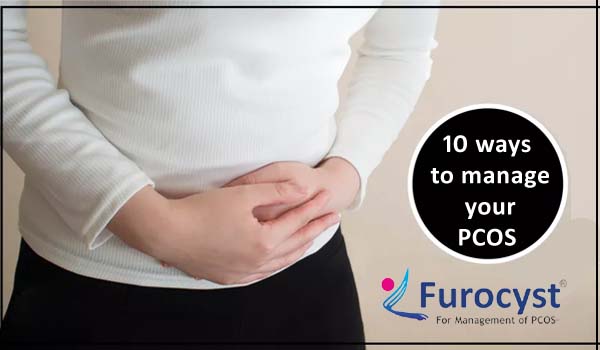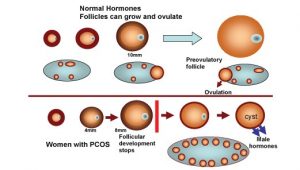PCOS has become common in women. However, many women are still unaware of this condition. The full form of PCOS is Polycystic Ovary Syndrome. 1 out of every 10 women are known to suffer from such disorder. It is likely to develop in the teenage years. Below are the 10 ways to manage your PCOS:
The symptoms vary depending on the age of a female. If the person is in her teen days then the signs are pimples, acne, thick facial hair and weight gain. On the other hand, it can be the reason behind a woman’s incapability to conceive. It can be managed if treated properly. Furocyst is one such effective and clinically proven solution. Besides that, other 10 ways to manage your PCOS are as follows:
Recognising the symptoms that your body is exhibiting
Start understanding the indication that your body is trying to give you. Once you get familiar with the signs you know the next step. Understanding will help you to proceed with the treatment accordingly.
Checking your insulin levels
Polycystic disorder is one of the primary reasons behind abnormality in insulin processing and vice versa. It is quiet confusing because your body will be over reactive to the carbohydrates and discharge excess of the same. The ovary in turn responds to it with the secretion of additional testosterone. Thus, you can reduce the chances of your ovary being polycystic by keeping a check on your blood glucose level.
Exercising on daily basis will keep diseases at bay. It is also effective to control PCOS. Committing at least 30 minutes of time from the entire day for exercise will help you to a large extent in keeping a check on the indicators.
Change your eating habit
Many studies and researches have concluded the fact that change in lifestyle and dietary habits are the major grounds to treat the affected women. Ladies who are more susceptible to frequent alteration in lifestyle are very likely to develop the disorder.
Being familiar with every detail
Changing the diet or lifestyle is indeed challenging. And if you are not aware of the reason behind such changes then it is more difficult. Thus, you must be familiar with all the negative consequences of the syndrome so that restricting yourself will not make you regret in any way.
Sketch a Schedule
Preparing a proper diet chart is crucial regardless of snack chart, meal chart, or craving chart. A proper planning will not let you ditch the regular exercises and making unhealthy choices of foodstuffs. The restriction is tougher other than proper routine.
Getting the team involved
A woman suffering from PCOS cannot take all the control measurements as a single person. She needs the support of her friends, close ones, family, relatives, and the doctor treating her. You should create your own team of supporters who will motivate, advice, and give tough yet soft love at the times of your need.
Swimming
Swimming is the best natural way to get rid of the disease. It is a form of effective exercise which not only helps you to shed the unwanted kilos but also manage Polycystic Ovary Syndrome.
Celebrating the victory
Doing the above-mentioned steps will assist you in overcoming the hurdle. Controlling eating style, exercising, etc is difficult to follow in a routine manner but the impact which they leave is admirable. It will help you to heal naturally with just support, love and care.
These are the 10 ways to manage your PCOS. If these advices are not making any noteworthy changes in your condition then you are recommended to have Furocyst. Composed of 100% natural ingredients’ extract, it has no known side effects. This supplement reduces the size of the ovary significantly and dissolves the cyst completely. Problems with menstrual cycle will also get dissolved.
Consumption of this supplement will not at all interrupt with your liver or kidney function. Instead, it cuts down the hypercholesterolemia and glucose processing. It is a promising natural dietary supplements perfect for the cysts. You are recommended to take two capsules a day.
For more,



























 AIIMS, shows that about 20-25 percent of Indian women of childbearing age are suffering from PCOS. While 60 percent of women with PCOS are obese, 35-50 percent have a fatty liver. About 70 per cent have insulin resistance, 60-70 percent have a high level of androgen and 40-60 percent have glucose intolerance
AIIMS, shows that about 20-25 percent of Indian women of childbearing age are suffering from PCOS. While 60 percent of women with PCOS are obese, 35-50 percent have a fatty liver. About 70 per cent have insulin resistance, 60-70 percent have a high level of androgen and 40-60 percent have glucose intolerance
 Female ovary secretes estrogen and progesterone that helps in the ovulation. It also secretes testosterone (Male Hormone) in small amount. In PCOS, the level of testosterone is elevated, which results in excessive growth of hair on the body. This condition also called as hirsutism.
Female ovary secretes estrogen and progesterone that helps in the ovulation. It also secretes testosterone (Male Hormone) in small amount. In PCOS, the level of testosterone is elevated, which results in excessive growth of hair on the body. This condition also called as hirsutism. Acne: In Pcos, the amount of androgen is increased. Androgens can increase the size of the oil producing glands on the skin, which can lead to increase in acne. Acne is common in adolescence, but young women with PCOS tend to have more severe acne.
Acne: In Pcos, the amount of androgen is increased. Androgens can increase the size of the oil producing glands on the skin, which can lead to increase in acne. Acne is common in adolescence, but young women with PCOS tend to have more severe acne. As we know that, there are very low or no early symptoms of PCOS, so most of the women do not notice or bother about it until it becomes severe. The symptoms of PCOS are sometimes equated to thyroid symptoms. TOO MANY WOMEN WITH PCOS GO UNDIAGNOSED. PCOS has a common overlooked negative aspect, mental health issues associated with the disorder. Depression, anxiety or even both are experienced in early adulthood. In addition to that, unwanted facial hair, excessive weight gain, and
As we know that, there are very low or no early symptoms of PCOS, so most of the women do not notice or bother about it until it becomes severe. The symptoms of PCOS are sometimes equated to thyroid symptoms. TOO MANY WOMEN WITH PCOS GO UNDIAGNOSED. PCOS has a common overlooked negative aspect, mental health issues associated with the disorder. Depression, anxiety or even both are experienced in early adulthood. In addition to that, unwanted facial hair, excessive weight gain, and 

 As men always said that we are complicated, yes, we are complicated. Because we go through several phases in our life. Our body goes through several changes, several processes, and several diseases also. Every year, every month there is a hormonal cycle in our body which affects us physically, mentally and emotionally. PCOS is one of the syndromes which many of us are unaware of.
As men always said that we are complicated, yes, we are complicated. Because we go through several phases in our life. Our body goes through several changes, several processes, and several diseases also. Every year, every month there is a hormonal cycle in our body which affects us physically, mentally and emotionally. PCOS is one of the syndromes which many of us are unaware of. hormone (FSH) and Luteinizing hormone (LH) manage the ovulation. FSH vitalizes the ovary to produce a follicle or sac that consists of an egg or ovum, while LH stimulates the ovary to generate mature egg.
hormone (FSH) and Luteinizing hormone (LH) manage the ovulation. FSH vitalizes the ovary to produce a follicle or sac that consists of an egg or ovum, while LH stimulates the ovary to generate mature egg. heart disorders, and stroke.
heart disorders, and stroke. e pancreas which can worsen the PCOS condition.
e pancreas which can worsen the PCOS condition. menstrual cycle.
menstrual cycle.














